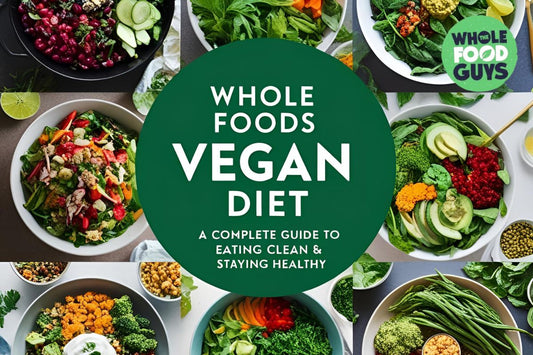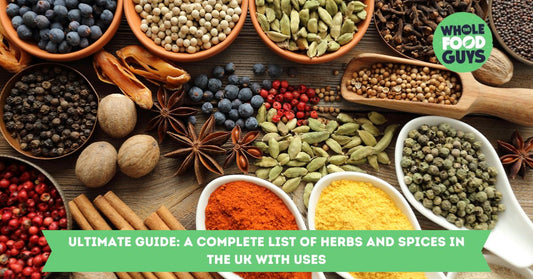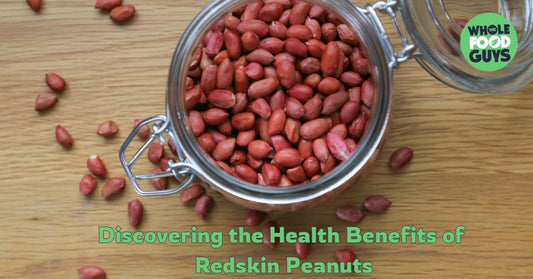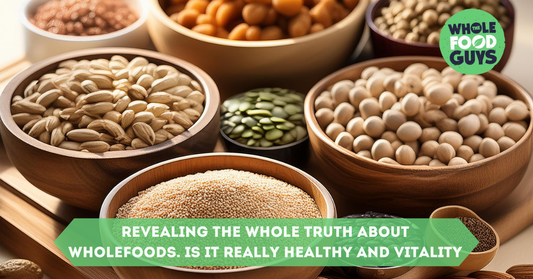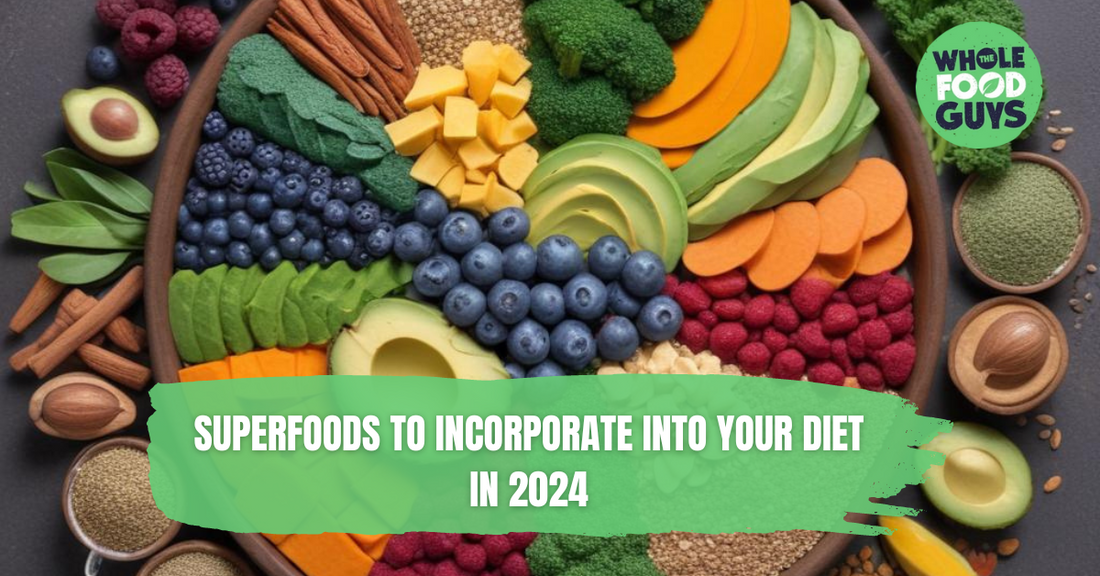
Superfoods to Incorporate into Your Diet in 2024
Introduction
Prioritizing our health and well-being remains a top goal for many. One of the best ways to achieve this is by incorporating superfoods into our diets. Superfoods are nutrient-rich foods considered to be especially beneficial for health and well-being. Here at The Whole Food Guys, we’re passionate about bringing you the best in natural nutrition.
Here are some superfoods you should consider adding to your diet this year.
1. Chia Seeds
Chia seeds are tiny powerhouses of nutrition. They are rich in omega-3 fatty acids, fiber, and antioxidants. Adding chia seeds to your diet can help with weight management, reduce inflammation, and improve heart health.
Health Benefits:
- High in Omega-3 Fatty Acids: Promotes heart health and reduces inflammation.
- Rich in Fiber: Aids digestion and promotes a feeling of fullness.
- Antioxidants: Protects against free radicals and oxidative stress.
How to Use Chia Seeds:
- Breakfast: Sprinkle them on your yogurt or oatmeal.
- Snacks: Mix them into smoothies.
- Desserts: Make a chia seed pudding by soaking them in almond milk and adding a touch of honey.
2. Quinoa
Quinoa is a complete protein, containing all nine essential amino acids. It is also high in fiber, magnesium, and iron. Quinoa is a versatile superfood that can be used in a variety of dishes.
Health Benefits:
- Complete Protein: Ideal for vegetarians and vegans.
- High in Fiber: Supports digestive health.
- Rich in Minerals: Contains magnesium, iron, and zinc.
How to Use Quinoa:
- Salads: Use it as a base for salads with vegetables and lean protein.
- Soups: Mix it into soups for added texture and nutrition.
- Side Dish: Serve it as a side instead of rice or pasta.
3. Goji Berries
Goji berries are known for their high levels of antioxidants, vitamins, and minerals. They have been used in traditional medicine for centuries to boost the immune system and improve overall health.
Health Benefits:
- Antioxidants: Protects cells from damage.
- Immune Boost: High vitamin C content strengthens immunity.
- Eye Health: Contains zeaxanthin, beneficial for eye health.
How to Use Goji Berries:
- Breakfast: Add them to your morning cereal or oatmeal.
- Smoothies: Blend them into smoothies for a nutrient boost.
- Snacks: Enjoy them as a dried fruit snack or mix into trail mix.
4. Spirulina
Spirulina is a type of blue-green algae that is incredibly nutrient-dense. It contains protein, vitamins B1, B2, and B3, iron, and copper. Spirulina is known for its powerful antioxidant and anti-inflammatory properties.
Health Benefits:
- Rich in Protein: Great for muscle growth and repair.
- Antioxidants: Helps combat oxidative stress.
- Anti-Inflammatory: Reduces inflammation in the body.
How to Use Spirulina:
- Smoothies: Mix spirulina powder into smoothies or juices.
- Supplements: Take spirulina supplements if you prefer.
- Snacks: Add it to homemade energy bars or snacks.
5. Turmeric
Turmeric has gained popularity for its anti-inflammatory and antioxidant properties, primarily due to its active ingredient, curcumin. It has been linked to improved brain function and a lower risk of brain diseases.
Health Benefits:
- Anti-Inflammatory: Reduces inflammation and pain.
- Antioxidant: Protects against free radical damage.
- Brain Health: Enhances brain function and reduces the risk of neurodegenerative diseases.
How to Use Turmeric:
- Cooking: Add turmeric powder to curries, soups, or stews.
- Beverages: Make a turmeric latte or golden milk.
- Supplements: Take curcumin supplements for concentrated benefits.
6. Kale
Kale is one of the most nutrient-dense foods on the planet. It’s loaded with vitamins A, K, C, and B6, as well as calcium, potassium, and magnesium. Kale can help with detoxification and is excellent for bone health.
Health Benefits:
- Detoxification: Supports the body's natural detox processes.
- Bone Health: High in calcium and vitamin K.
- Rich in Antioxidants: Helps reduce oxidative stress.
How to Use Kale:
- Salads: Use fresh kale in salads.
- Smoothies: Blend kale into green smoothies.
- Snacks: Make baked kale chips for a healthy snack.
7. Matcha Green Tea
Matcha green tea is made from ground whole tea leaves and is known for its high antioxidant content. It provides a calm energy boost and is excellent for detoxification and weight loss.
Health Benefits:
- Antioxidants: High levels of catechins, especially EGCG.
- Energy Boost: Provides a calm and sustained energy boost.
- Detoxification: Supports liver health and detox processes.
How to Use Matcha:
- Tea: Prepare traditional matcha tea.
- Smoothies: Add matcha powder to smoothies.
- Baking: Use in baking recipes for added flavor and nutrition.
8. Acai Berries
Acai berries are packed with antioxidants, fiber, and heart-healthy fats. They are known for their potential to improve cholesterol levels and boost brain function.
Health Benefits:
- Heart Health: Contains heart-healthy fats.
- Brain Function: Improves cognitive function.
- Antioxidants: High in anthocyanins, which protect against oxidative stress.
How to Use Acai Berries:
- Smoothie Bowls: Use acai powder in smoothie bowls.
- Smoothies: Blend with other fruits for a nutrient-packed smoothie.
- Supplements: Take acai berry supplements.
9. Hemp Seeds
Hemp seeds are a fantastic source of plant-based protein, omega-3 and omega-6 fatty acids, and a variety of vitamins and minerals. They are great for heart health and can help reduce inflammation.
Health Benefits:
- Plant-Based Protein: Ideal for vegetarians and vegans.
- Healthy Fats: Contains omega-3 and omega-6 fatty acids.
- Anti-Inflammatory: Reduces inflammation in the body.
How to Use Hemp Seeds:
- Salads: Sprinkle on salads for added texture and nutrition.
- Smoothies: Blend into smoothies for a protein boost.
- Breakfast: Mix into your morning oatmeal or yogurt.
10. Blueberries
Blueberries are high in antioxidants, particularly anthocyanins, which have been shown to improve brain function and reduce the risk of heart disease. They are also a great source of vitamins C and K.
Health Benefits:
- Brain Health: Improves memory and cognitive function.
- Heart Health: Reduces the risk of heart disease.
- Antioxidants: Protects against oxidative stress.
How to Use Blueberries:
- Breakfast: Add fresh or frozen blueberries to your cereal or yogurt.
- Snacks: Enjoy them as a healthy snack.
- Baking: Use in muffins, pancakes, or desserts.
11. Broccoli
Broccoli is a cruciferous vegetable known for its impressive nutrient profile, including vitamins C, K, and A, as well as fiber, potassium, and folate. It’s also rich in sulforaphane, a compound with potent anticancer properties.
Health Benefits:
- Cancer Prevention: Contains sulforaphane, which may help reduce cancer risk.
- Digestive Health: High in fiber.
- Bone Health: Rich in calcium and vitamin K.
How to Use Broccoli:
- Steamed: Steam and season as a side dish.
- Stir-Fries: Add to stir-fries with other vegetables and proteins.
- Soups: Blend into soups for a creamy texture and added nutrition.
12. Avocado
Avocado is a nutrient-dense fruit high in healthy fats, fiber, and a variety of vitamins and minerals, including potassium and vitamin E. It’s known for its benefits in heart health and weight management.
Health Benefits:
- Heart Health: High in monounsaturated fats.
- Weight Management: Promotes satiety due to high fiber content.
- Nutrient Absorption: Helps absorb fat-soluble vitamins.
How to Use Avocado:
- Salads: Add sliced avocado to salads.
- Smoothies: Blend into green smoothies for creaminess.
- Toast: Spread on whole-grain toast for a healthy breakfast.
13. Sweet Potatoes
Sweet potatoes are a rich source of fiber, vitamins A and C, and antioxidants. They have a low glycemic index, making them a great choice for stable blood sugar levels.
Health Benefits:
- Vision Health: High in beta-carotene, which is converted to vitamin A.
- Immune Support: Contains vitamin C and other antioxidants.
- Blood Sugar Control: Low glycemic index helps manage blood sugar levels.
How to Use Sweet Potatoes:
- Baked: Bake them and serve as a side dish.
- Mash: Mash with a bit of olive oil or butter.
- Fries: Make healthy sweet potato fries in the oven.
Practical Tips for Incorporating Superfoods
- Start Small: Begin by adding one or two superfoods to your diet and gradually increase the variety as you get used to them.
- Experiment with Recipes: Try different recipes to find the best ways to enjoy these superfoods. Smoothies, salads, and snacks are great starting points.
- Plan Your Meals: Incorporate superfoods into your meal planning to ensure you consistently include them in your diet.
- Educate Yourself: Stay informed about the nutritional benefits of superfoods and how they can improve your health.
Conclusion
Incorporating these superfoods into your diet can significantly enhance your overall health and well-being. At The Whole Food Guys, we are committed to providing you with the highest quality superfoods to support your health journey in 2024 and beyond. Visit our website for more information on our products and how they can benefit you.















